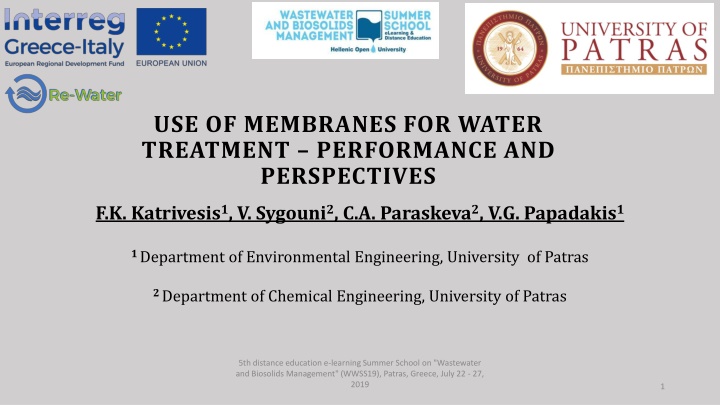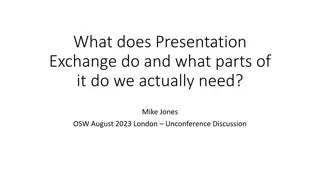
Membrane Technology for Water Treatment: Performance & Perspectives
Learn about the use of membranes in water treatment, focusing on the principles of adsorption, sieving, and electrostatic phenomenon. Discover the results and benefits of membrane filtration in laboratory studies, including improved separation capabilities and higher quality permeate stream.
Download Presentation

Please find below an Image/Link to download the presentation.
The content on the website is provided AS IS for your information and personal use only. It may not be sold, licensed, or shared on other websites without obtaining consent from the author. If you encounter any issues during the download, it is possible that the publisher has removed the file from their server.
You are allowed to download the files provided on this website for personal or commercial use, subject to the condition that they are used lawfully. All files are the property of their respective owners.
The content on the website is provided AS IS for your information and personal use only. It may not be sold, licensed, or shared on other websites without obtaining consent from the author.
E N D
Presentation Transcript
USE OF MEMBRANES FOR WATER TREATMENT PERFORMANCE AND PERSPECTIVES F.K. Katrivesis1, V. Sygouni2, C.A. Paraskeva2, V.G. Papadakis1 1 Department of Environmental Engineering, University of Patras 2 Department of Chemical Engineering, University of Patras 5th distance education e-learning Summer School on "Wastewater and Biosolids Management" (WWSS19), Patras, Greece, July 22 - 27, 2019 1
Introduction Removal of contaminants in water is required to prevent human health and to protect the environment. Climate change brings frequent and prolonged droughts. Engineers are focused on safeguarding water supply. Use of membranes has become popular in water and wastewater treatment. Membrane separation depends mainly on three basic principles; adsorption, sieving and electrostatic phenomenon 5th distance education e-learning Summer School on "Wastewater and Biosolids Management" (WWSS19), Patras, Greece, July 22 - 27, 2019 2
Laborator y Evaluation Study Aqueous solution was used to simulate the turbidity of the Glafkos River surface water. Sand column device: diameter: 90mm, filter height: 1500mm; granulometries: 0.6~1 & 1~1.4mm UF: ceramic, length: 1020mm, pore size: 100nm, surface area: 0.24m2. 5th distance education e-learning Summer School on "Wastewater and Biosolids Management" (WWSS19), Patras, Greece, July 22 - 27, 2019 3
Results Results 5th distance education e-learning Summer School on "Wastewater and Biosolids Management" (WWSS19), Patras, Greece, July 22 - 27, 2019 4
Results Results 70ntu @ 71cm 1.0 70ntu @ 71cm 100 0.9 U=2.5mm/s D<1.0mm 0.8 80 0.7 U=2.5mm/s D>1.0mm Turbidity C/C0 mmHg 0.6 60 U=1.8mm/s D<1.0mm 0.5 0.4 U=1.8mm/s D>1.0mm 40 0.3 U=1.0mm/s D<1.0mm 0.2 20 0.1 U=1.0mm/s D>1.0mm 0.0 0 0 2 4 6 8 0 5 t hr t hr 5th distance education e-learning Summer School on "Wastewater and Biosolids Management" (WWSS19), Patras, Greece, July 22 - 27, 2019 5
1.0 10.0 70 TU 1.0 70 NTU 1.4 0.9 9.0 0.9 Permeate Turbidity C/C0 Concentrate Turbidity C/C0 0.8 8.0 1.2 0.8 Permeability m3/bar.m2 0.7 7.0 0.7 Flux m3/h 1.0 0.6 6.0 0.6 0.5 5.0 0.8 0.5 0.4 4.0 0.6 0.4 0.3 3.0 0.3 0.4 0.2 2.0 0.2 0.1 1.0 0.2 0.1 0.0 0.0 0.0 0.0 0.00 0.10 0.20 t hr 0.30 0.40 0.00 0.10 0.20 0.30 t hr In deep sand filtration experiments, the surface loading of the filter greatly affects the process and the filtration capacity is a decreasing function of the flow rate. UF unit gave excellent separation capabilities, yielding permeate stream with characteristics of higher quality. 5th distance education e-learning Summer School on "Wastewater and Biosolids Management" (WWSS19), Patras, Greece, July 22 - 27, 2019 6
Field Performance Study Ultrafiltration (UF) with membrane technology: ensures excellent removal of suspended materials (colloids, solids, bacteria, Cryptosporidium and Giardia etc.). as a post-treatment stage in the effluent of the activated sludge process, the filtrate is suitable for irrigation without restrictions according to Greek legislation (Quality Requirements according to KYA.145116/2011). can achieve complete retention of solids and the BOD contained in the activated sludge process effluent. has small footprint, easy upgrade and upgrading of old sewage treatment plants. 5th distance education e-learning Summer School on "Wastewater and Biosolids Management" (WWSS19), Patras, Greece, July 22 - 27, 2019 7
Pilot Installation Site The membranes used in this process should have pore size suitable for the application and total filtration area capable of producing the required amount of permeate per day. To reduce fouling phenomena, the membranes must operate in cross-flow mode, and have a built-in back- wash cleaning process. The unit must be fully automated, with pre-programmed cleaning procedures after each filtration cycle, defined by the supplier. The unit must also have the appropriate piping and pumping systems for its operation and be enclosed in a metal casing for easier transportation and protection of the equipment. Finally, the membrane unit should have a small footprint making its installation flexible. 5th distance education e-learning Summer School on "Wastewater and Biosolids Management" (WWSS19), Patras, Greece, July 22 - 27, 2019 8
The South Municipal Park near Patras sewage treatment facility with a total surface of 50,000 m2 will be irrigated using the treated water with UF membranes. 5th distance education e-learning Summer School on "Wastewater and Biosolids Management" (WWSS19), Patras, Greece, July 22 - 27, 2019 9
Ac k n o w l e d g e m e n t s This work was financially supported by the project Re-Water, Eco- technologies for the wastewater implemented under the Interreg Greece-Italy 2014-2020 , co- financed by European Regional Development Fund and Greece. management which is Thank you for your attention! 5th distance education e-learning Summer School on "Wastewater and Biosolids Management" (WWSS19), Patras, Greece, July 22 - 27, 2019 10






















